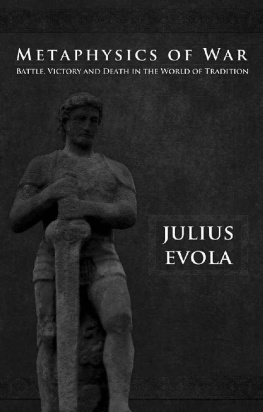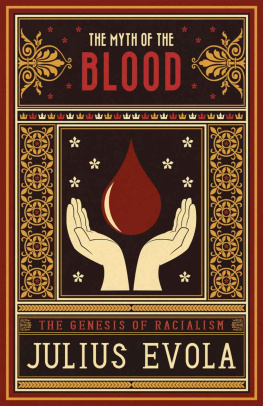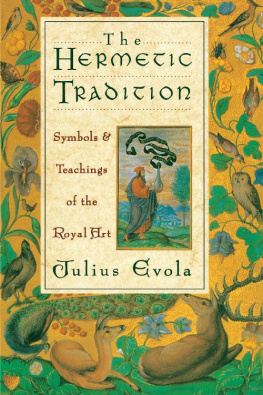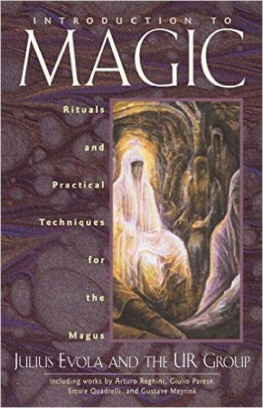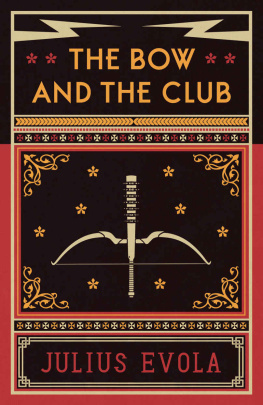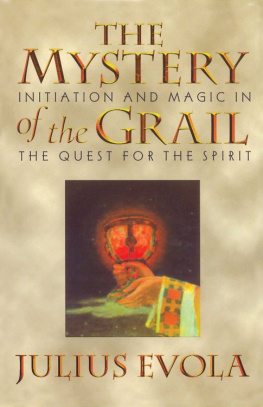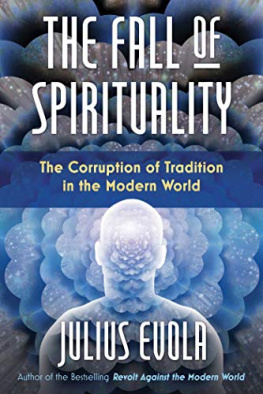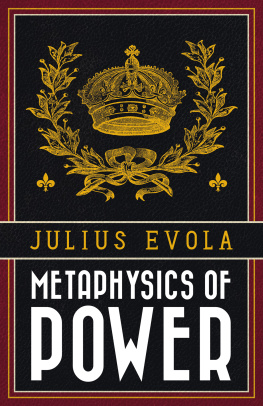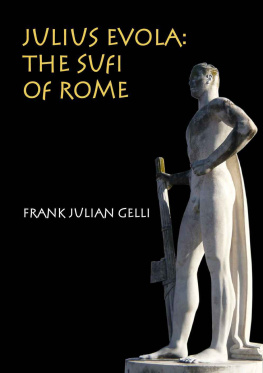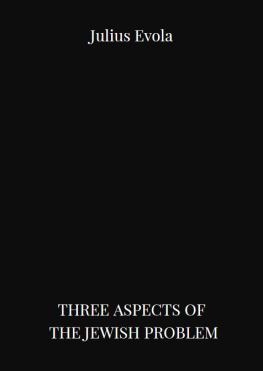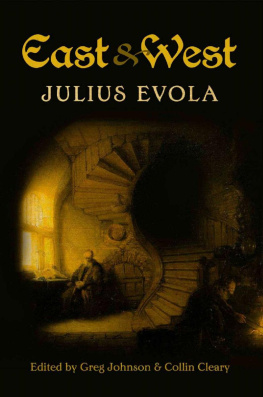Third English edition published in 2011 by Arktos Media Ltd.
First edition published in 2007 by Integral Tradition Publishing.
Second edition published in 2008 by Integral Tradition Publishing.
2011 Arktos Media Ltd.
No part of this book may be reproduced or utilised in any form or by any means (whether electronic or mechanical), including photocopying, recording or by any information storage and retrieval system, without permission in writing from the publisher.
Editor: John B. Morgan
ARKTOS MEDIA LTD.
Introduction
by John B. Morgan IV
T he Julius Evola to be found in this volume is one who has, thus far, remained largely unknown to English-speaking readers, apart from how he has been described second-hand by other writers namely, the political Julius Evola. With the exception of Men Among the Ruins , which defines Evolas post-war political attitude, as well as the essays made available on-line and in print from the Evola as He Is Web site, all of Evolas works which have been translated into English prior to the present volume have been his works on esotericism, and this is the side of his work with which English-language readers are most familiar. The essays contained in this book were written during the period of Evolas engagement with both Italian Fascism and German National Socialism, and, while Evola regarded these writings as being only a single aspect and by no means an aspect of primary importance of his work, it is for these writings that he is most often called to account (and nearly always harshly condemned) in the court of the academicians and professional historians. For this reason alone, then, it is of great value that these essays are being made available so that English-speaking readers can now form their own opinion of Evolas work in this area. And for those who are interested in Evola as a teacher, then these essays will serve to open up an area of his work that his hitherto remained largely inaccessible, and which contains a great deal of practical advice for the traditionally-minded student.
It is important to remember while reading these essays, however, that Evola himself made no distinction between the various areas of culture with which he chose to engage areas which have been artificially divided from each other by the philosophy of modernity, which treats the entire body of universal knowledge as a creature to be dissected and examined, one organ at a time, beneath a microscope, and thus each part of the creatures body is only understood as a thing in itself, without any understanding of how it relates to the whole. Evolas approach to knowledge was traditional, and therefore it was integrated in nature. For him, there was always only one subject: Tradition, which, as his friend Ren Gunon had first defined it, is the timeless and unchanging esoteric core which lies at the heart of all genuine spiritual paths. Traditionalism, a term which Evola himself never used, refers to the knowledge and techniques derived from sacred texts that the individual can use to orient himself in order to know Tradition, and in knowing it, thereby live all aspects of his life in accordance with it. Politics was only of interest to Evola in terms of how the pursuit of certain political goals could be of benefit toward the spiritual advancement of a traditionally-minded individual, and also in terms of how the distasteful business of politics might be able to bring modern societies closer into line with the values and structures to be found within the teachings of traditional thought.
During the 1930s, two political phenomena seemed to bear some hopeful possibilities for him in terms of how they might be utilised as vehicles for the restoration of something at least approximating a traditional society: Italian Fascism and German National Socialism (Nazism). At no point, however, was Evola a starry-eyed, fanatical revolutionary, filled with idealistic enthusiasm for the cause. Indeed, in 1930 he wrote about Fascism, To the extent to which Fascism embraces and defends [traditional] ideals, we shall call ourselves Fascists. And this is all. Reflecting on his political engagements later in life, he further wrote:
Philosophy, art, politics, science, even religion were here stripped of any right and possibility to exist merely in themselves, and to be of any relevance outside a higher framework. This higher framework coincided with the very idea of Tradition... [My goal was] to defend ideals unaffected by any political regime be it Fascist, Communist, anarchist or democratic. These ideals transcend the political sphere; yet, when translated on the political level, they necessarily lead to qualitative differences which is to say: to hierarchy, authority and imperium in the broader sense of the word as opposed to all forms of democratic and egalitarian turmoil.
Taking all of Evolas comments into account, both before and after the war, he never considered himself to be very much of a Fascist. He understood from the beginning that both Fascism and National Socialism were thoroughly modern in their conception. In 1925, Evola had already written that Italian Fascism lacked a cultural and spiritual root, which it had only tried to develop after gaining power, just as a newly rich man later tries to buy himself an education and a noble title. Both Fascism and National Socialism relied on the masses for their support, which set them apart from the rule by aristocracy of the traditional world, and National Socialism was obsessed by a race theory derived from modern, scientific concepts of evolution and biology which were thoroughly anti-traditional.
Given so many problems with Fascism and Nazism from a traditional perspective, then why did Evola ever show any interest in them at all? The answer lies in the spirit of the times. By the 1930s, it was clear that the democratic nations of Western Europe and the United States, the Communist Soviet Union, and the fascistic countries were all on a collision course with each other. And, despite their many flaws, the fascist movements, unlike democratic and Communist societies, were at least attempting to restore something akin to the traditional, hierarchical order within the social structure of the modern world an order which had gone unquestioned throughout the histories of all civilisations for thousands of years, prior to the onset of modernity. While Fascism and National Socialism were thoroughly modernist in their conception, Evola believed that, given time, they could potentially be used as a gateway to re-establish an order in Europe based on genuinely traditional values, and that they might even eventually give rise to genuinely traditional social forms which would supercede them. It is in this context that these essays some of which contain direct references to Fascism, being addressed to either Italian or German readerships as they originally were should be understood.
Evolas political ideal was always the Roman Empire. It is invoked repeatedly throughout these essays. The Fascists spoke frequently about ancient Rome, just as the Nazis constantly invoked the myth of an idealised Nordic past. Their understanding of these ancient wonders, however, was of an extremely superficial sort, which in practice didnt extend beyond constructing new buildings in the style of the ancient world, and engendering artistic styles that were a mere imitation of the Classical era. Evola wanted to bring about change on a much deeper level. He didnt just want a few cosmetic changes to be made he wanted modern-day Italians to actually resume thinking and behaving as their ancient ancestors had done. In short, he wanted the Italians to become like the ancient Romans in thought, word and deed. This is why, for him, Fascism fell far short of his hopes for it in his writings, he sometimes referred to what he wanted as super-fascism. By using this term, he did not mean that he wished for more of what Fascism was already offering. Rather, he was calling for a transcendence of Fascism. He wanted for the Fascist revolution to tunnel inward, into the very soul of each individual Italian, and awaken the long-buried racial memory of their illustrious Imperial ancestors. When Italy disappointed him, he transferred his hopes to the Germans, particularly in the form of the Schutzstaffel (S.S.), which, with Heinrich Himmlers efforts to fashion it into something akin to a Medieval knightly order, seemed to hold a spark of the ancient Teutonic Knights within them. Evola was even invited to deliver a series of lectures to representatives of the S.S. leadership in 1938. However, the S.S. was fixated upon the Nazis purely biological definitions of racial purity and their belief in the supremacy of the Nordic peoples, and as such they were unimpressed by the ideas of the Latin Evola, who proposed the idea that spirit and character were as important to ones racial qualifications as ancestry and blood. He was politely sent away. As such, Evolas hope to influence the political forces of the period in such a way as to implement his plan for the spiritual and cultural regeneration of Europe was never to be realised.

